If you want to get chickens and have neighbors nearby, you’re likely pondering this question – “Are chickens noisy?” You probably already know that roosters are noisy, but you’d be surprised by the squabble that hens can make, too!
Therefore, you’ll want to be sure that you’re prepared for the potential noise before you commit to bringing them into your backyard or homestead. If you already own chickens and just want to better understand their “chicken language” – this post is for you, too!
In this article we’ll discuss the different types of noises that you can expect from your chickens (with live recordings!), how to reduce chicken noise, the quietest chicken breeds, and more!
Let’s dive in!
*Disclosure: This post may contain affiliate links to products (including Amazon). I’ll earn a small commission if you make a purchase through my link, at no additional cost to you! Regardless, I only link to products that I personally use on our homestead or believe in.
Types of Chicken Noises
Roosters
Let’s just get this one out of the way. Roosters are LOUD. All day, every day. Roosters start crowing when they are ~8 weeks old and won’t stop until their last day. If you are worried about noise or live in town, then I would recommend not keeping a rooster around. Most cities won’t allow them for this exact reason.
However, if you can handle the noise, I will say that roosters are great additions to the homestead. They not only provide for and protect the hens, but they also ensure egg fertilization so you can have a steady supply of chicks! True self-sufficiency at its finest.
However, they certainly aren’t for everyone, and will alarm the neighborhood at 4am!
Normal Chatting
I love listening to the hens chattering away at each other! It’s not very loud and consists of short clucks or squacks. Most of the conversations happen in the morning while they are waiting to be let out, or when it’s close to treat time and the hens are trying to remind me of it.
Food Calling
This sound is often made by the head rooster to his ladies. It’s a short chip-chip-chip or cluck-cluck-cluck sound to say “hey, come look at what I found for you!”
It’s a sweet, selfless act that I really enjoy listening too. Most chickens are pretty selfish and eat what they find right away, but there are usually a few providers in the flock who offer what they find to others.
Alarm
When chickens see a predator fly over or run through the yard, everyone knows it! This call is loud in order to warn their fellow flock mates; similar to a loud growl. It sounds almost like a tiny dinosaur roaring!
If it’s an aerial predator, the call is high-pitched, and if it’s a ground predator, the call is low-pitched. This helps direct the other flock mates on where to look and how to respond.
Dispute
Chickens get into squabbles with each other, just like humans do! Since they can’t talk, they do it with general squawking at each other. These squabbles can be over a favorite nesting box, a tasty treat, or a favorite roosting spot.
These squawks are fairly loud, and can continue for extended periods of time while they are sorting out their issue. Therefore, ensuring that there is adequate coop space, roosting space, feeder space, nesting boxes, etc. is helpful to keep the dispute squawking noise to a minimum.
Egg Song
This is one of the loudest noises that you’ll hear your hens make. It’s like a little celebration (or sigh of relief) after they lay their egg and they want all of their friends to know about it.
The egg song goes something like “buh-buh-buh-gawk” on repeat until she feels like she has sufficiently accomplished her celebration. Some of her friends may even join in on her song!
Broody Hen Noises
A broody hen is one who has decided that it’s her time to become a mama and incubate some eggs. She will flatten herself on the nest and only get off for brief periods to eat and take care of her business. As a result, broody hens will often lose 20% of their weigh during this 21-day period.
Broody hens make several new, specific noises during this period. Check them out below!
Broody Hen Growl
Mama hens are very protective of their developing eggs, and chicks once they hatch. If flock mates (or you!) get near her nest or chicks, she will likely puff up her feathers and let out a low growl as a warning to stay back.
Broody Hen Cluck
This is a noise that you’ll likely hear throughout the day once the baby chicks hatch. It’s a short, repeating chip-chip-chip sound that’s fairly soft in intensity.
This is the mama hen’s way of grabbing their attention. It’s used to communicate things like “come to me,” “look at this treat,” or “I’m over here.” It’s so sweet to watch them interact!
Baby Chicks
For being so small, baby chicks have some powerful lungs! If they are happy, you won’t hear much beyond pressure frills (sounds like a purring cat) or soft peeps while they discover their environment. However, if they are cold, separated from their flock mates, or feel threatened, be prepared for their shrill panic calls! I can usually hear it from well across the yard.
Are Chickens Noisy at Night?
Chickens are nearly silent at night unless something disturbs them. Their vision is very poor in the dark, so no action is going on when the lights are out. As long as your coop is predator-proof, you shouldn’t hear a peep from them all night.
How to Reduce Chicken Noise
Ultimately, chickens are living creatures and will inevitably make some noise. However, a few things can be done to keep the noise to a minimum, especially if you live in the city.
Quietest Chicken Breeds
While all chickens will make some noise, there are a few breeds out there that are known for being docile, calm, and quiet.
- Barred Rock
- Brahma
- Cochin
- Maran
- Orpington
- Plymouth Rock
- Rhode Island Red
- Silkie
- Wyandotte
*Also, consider avoiding breeds that are aggressive or flighty; they also tend to be pretty chatty! These include breeds such as Anconas, Andalusians, Appenzeller Spitzhaubens, Leghorns, Malays, and Mincoras.
Provide Adequate Space
This is essential not only to keep the noise level down (happy chickens = quiet chickens), but also for their health. A cramped space can result in stress, fights and disease.
- Provide 3-4 square feet of coop space for each chicken to ensure that everyone will be happy and healthy. The more, the better!
- Provide 1 nesting box per 4-5 hens to keep the squabbling down at egg-laying time.
*Read more tips in my article Inside a Chicken Coop: 5 Required Items (and 3 to AVOID!)
Predator Proof Your Coop
You should be doing this anyway to protect your chickens from curious creatures, but this will certainly help keep the noise down as well. A startled or attacked chicken is a very loud chicken! We’ve taken great care to predator-proof our coop and haven’t had a break-in in nearly 10 years!
Here are my best tips for predator-proofing your coop:
- Use hardware cloth, not chicken wire, for the bottom of your run and windows. Chicken wire is weak and is only effective at keeping chickens in, not keeping predators out. Hardware cloth is more expensive, though, so we only use it where it’s absolutely needed, like the bottom 3 feet of the run and windows.
- Consider burying 12” of hardware cloth under the ground, bent up to be perpendicular to the fence and extending away from the run. This will prevent neighbor dogs, coyotes, or foxes from digging under your fence.
- Secure your doors from the top and bottom. This will ensure that the door stays snugly shut against curious raccoon or bear hands, both of which we have in our area!
Don’t Use a Light in Your Coop
In the winter, it is common to add a light to the coop that turns on in the early morning hours to provide 14 hours of daylight to promote laying. However, this may mean that your chickens are getting busy at 4 am, which may not be desirable if you have neighbors nearby.
If you are worried about having an egg shortage in the winter by not using a light, save up your eggs during the high-production months and preserve them with water glassing!
Insulate Your Coop
Adding insulation into the walls of your coop will definitely dampen the noise, especially since hens’ “egg song” is the loudest. If you live in a cold-weather state like me, then adding insulation is a great move to protect your chickens in the winter, anyway.
Definitely check out my article on Chicken Coop Winterizing and my YouTube video below for more tips!
Use Treats
Sometimes, hens get stuck in a cycle of their dispute calls for so long that I don’t think they even remember what they were squabbling about in the first place. They just carry on, and on, and on.
In these cases, I’ve found that providing a tasty distraction is all they need to snap them out of it. Spreading out a handful of scratch grains seems to do the trick every time!
Be careful with how much scratch grains you feed, though. Scratch grains are like candy to chickens and should only make up a small portion of their diet.
Rehome Noisiest Chickens
When all else fails, you may need to rehome your most “chatty” hens to a more rural location.
How to Reduce Rooster Noise
If you plan to keep a rooster, keep reading! Roosters are certainly the loudest with their crow reaching 130 decibels, or more. That’s equivalent to standing 50 feet from a jet taking off! Yikes!
Keep Larger Breeds
I’ve raised hundreds of roosters by now and I’ve definitely noticed some patterns!
- Small breed roosters not only tend to be more flighty and crow more, but they also have a higher-pitched, shrill crow that seems to carry quite well.
- Larger breed roosters tend to be more laid back, crow less, and have a lower-pitched crow that hardly makes it to the house. Much better! I’ve had the best luck with Rhode Island Reds, Cochins, Wyandottes, Barnevelders, Welsummers, and Maran roosters.
Mind Their Personality
This one is huge! You could raise 3 roosters of the same breed and in the same exact way, yet get totally different results. Each rooster has their own vibrant personality and there’s really no changing that once it’s established.
Some roosters like to crow all day, every day, no matter what (which can drive me crazy!). I don’t mind the occasional crowing, but obnoxious crowing all day long is just too much for us at our peaceful homestead.
My key to success is raising a handful of roosters so that I can watch their personalities and crowing patterns develop. Then, I select my favorites to keep at the end. Definitely read my article on How to Cook A Rooster for when the time comes! If you want some extra help on butchering day, check out my mini course below!
Avoid Breeding Pens
This one is huge! Roosters are very competitive and territorial. If you have roosters separated in their own breeding pen, they will engage in “crowing competitions” between each other. If you have a neighbor nearby with a rooster, they might crow between each other, too!
Use a Crow Collar
There are devices on the market called crow collars that can be used to reduce the decibel level of the rooster’s crow. It will not stop or reduce the frequency of the rooster’s crowing, only the power behind it.
Many people feel that this is an inhumane option, however, it can be very successful as long as the crow collar is applied properly and with close monitoring. Plus, if this means that your rooster can live another day, I’d say it’s worth a try.
You can find crow collars on Amazon, however, they are of poor quality and the reviews reflect that. If you want to go this route, I’d recommend the following well-designed products:
-
- Rewild Rooster Collar from RewildFarms
- Crow Reduction Webbing Collar from RoseAndBeesLtd
- No Crow Rooster Collar
How to Address Chicken Noise With Your Neighbors
If you live on less than 1 acre, then you’ll want to consider a few things to ensure that you don’t drive your neighbors crazy!
Careful Coop Placement
Most of the chicken noise comes from inside or around the immediate coop area. Chickens will explore the surrounding yard area, but they tend to be fairly quiet and with less squabbles when they are out by themselves.
Therefore, be mindful of where you place your coop. While you may be tempted to place it away from your own house to keep the noise and smell down, your neighbor may not be thrilled if it’s placed near the property line.
If you can find a location that is next to a hill or a storage shed, this will help block some of the sound. If you are building a coop, consider omitting windows on the wall that faces your next-door neighbor.
Install a Privacy Fence
If you are in town, this is a great step to take. Not only will it block some of the noise, but it will keep curious neighbor dogs from noticing that you have tasty chickens on the other side!
Lastly, a privacy fence will help contain your chickens in your yard, rather than wandering over to your neighbors. Chickens love to make a mess of flower beds and gardens, which I’m sure your neighbor won’t appreciate!
Friendly Conversation
This is a must if you live in town. Strike up a conversation with your neighbors and see how they’d feel about welcoming some chickens next door. Let them know that you’ve researched chicken noise and what to expect.
Nearly all chicken noise (except for a rooster crow) is quieter than a dog barking, so keeping hens should be a non-issue unless you have an uptight neighbor. A hen’s cluck only comes in at 60 decibels, which is equivalent to human conversation. A dog’s bark or lawn mower comes in at 90 decibels.
Offer Some Eggs!
Most people are more than happy to put up with a little hen squabble here and there in exchange for some fresh eggs every once in a while! This might help you win over some neighbors who are taking a while to warm up to the idea of having chickens next door.
Clip Their Wings
Chickens aren’t excellent flyers, but they can get around! If they end up getting stuck on the wrong side of the fence, they’ll definitely make a lot of noise! A sure way to annoy your neighbors.
Clipping their flight feathers is an easy way to keep them on the right side of the fence. If you’d like to learn how, check out this informative YouTube video by Becky’s Homestead.
Best Chicken Books
Here are my favorite chicken books that I reference often! If you’re just getting started with chickens, or are an experienced chicken keeper, these are great resources for all.
The Homesteading RD's Product Picks | |
This is my go-to chicken book! Full of practical advice. It covers everything you need to know from coop design, chicken health and incubating eggs. | |
This is my second chicken book that I default to if I can't find an answer in the book above, or if I just want a second opinion. Another solid resource! | |
Over the years, I've found that the chicken health sections in the 2 books above are just not thorough enough. This chicken health handbook is a great resource to have for whatever health issues come your way. | |
Other Articles You’ll Love
- Inside a Chicken Coop: 5 Required Items (and 3 to AVOID)
- How to Care for Chickens: A Beginners Guide
- Chicken Coop Winterizing – 6 Helpful Tips!
- Cooking a Rooster: The Basics
Final Thoughts
I hope that you are now feeling confident in your choice to raise chickens and have a good understanding of what noise to expect.
Chickens are living creatures, so some noise is to be expected, but overall it’s quite manageable as long as they aren’t startled or getting on each other’s nerves. Once you get to know your flock and each of their unique ways of communicating, it’s fun to listen in and understand what they are chatting about.
*All of the information above was referenced from my favorite chicken book Storey’s Guide to Raising Chickens and personal experience, unless otherwise specified.

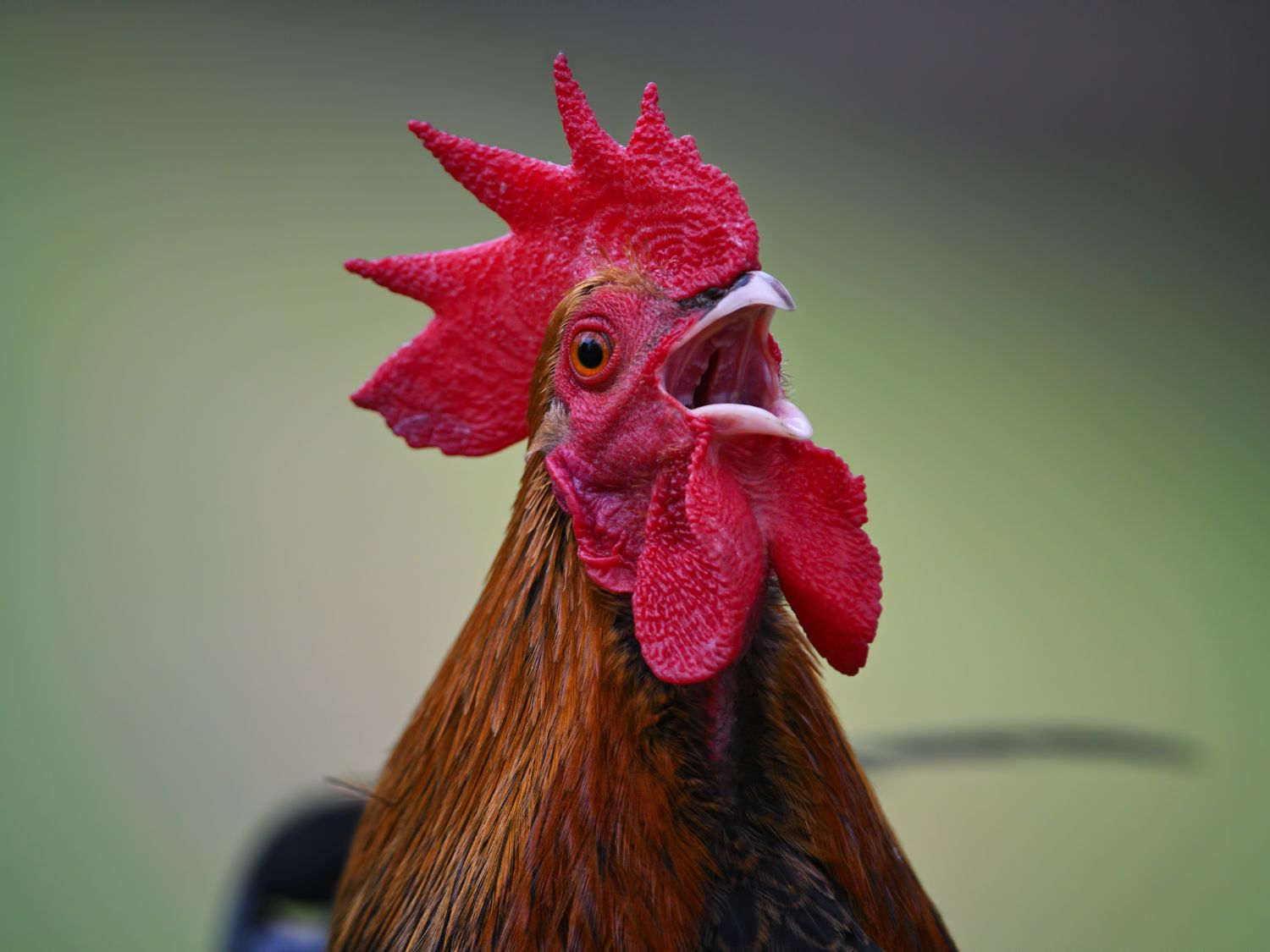
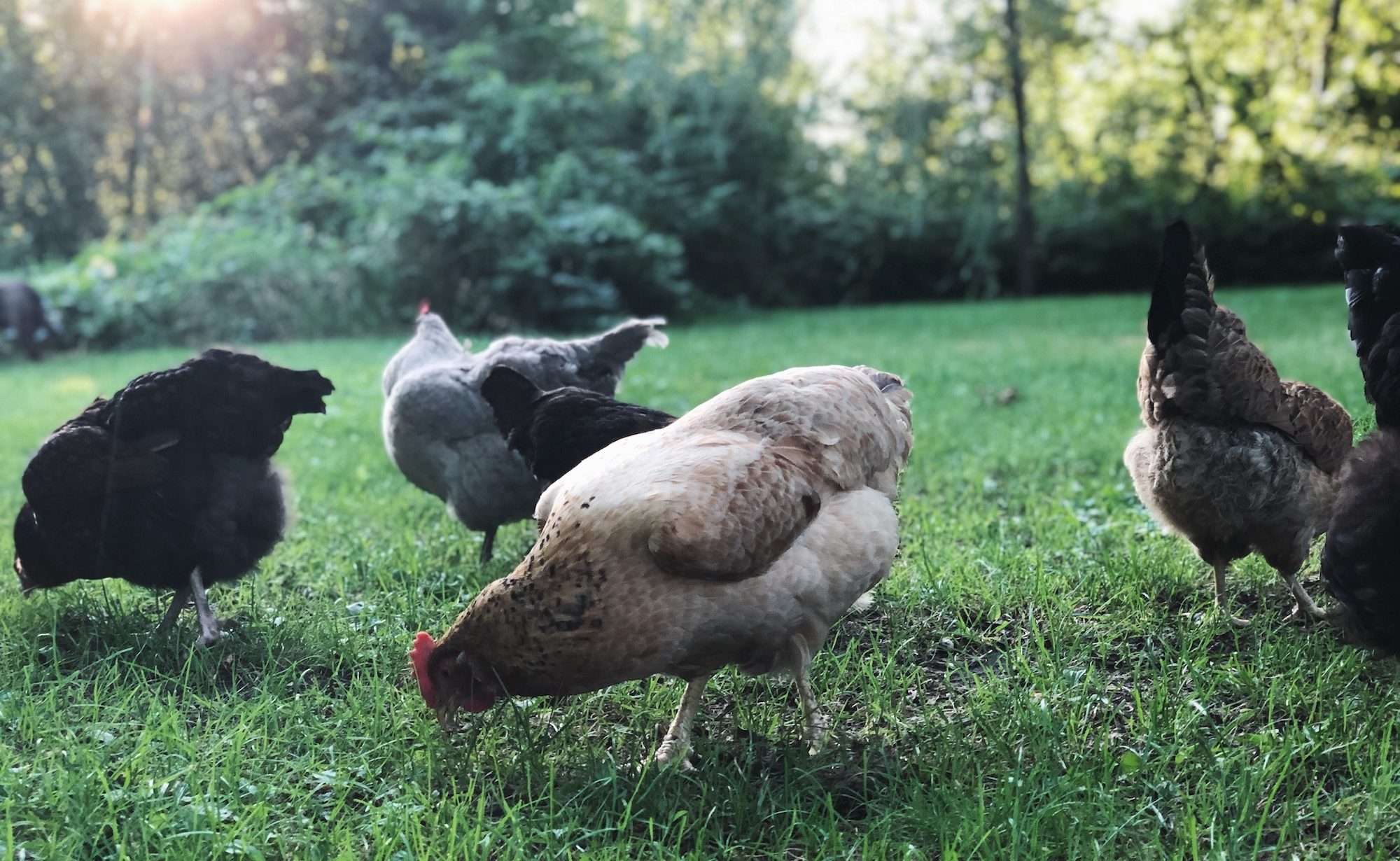

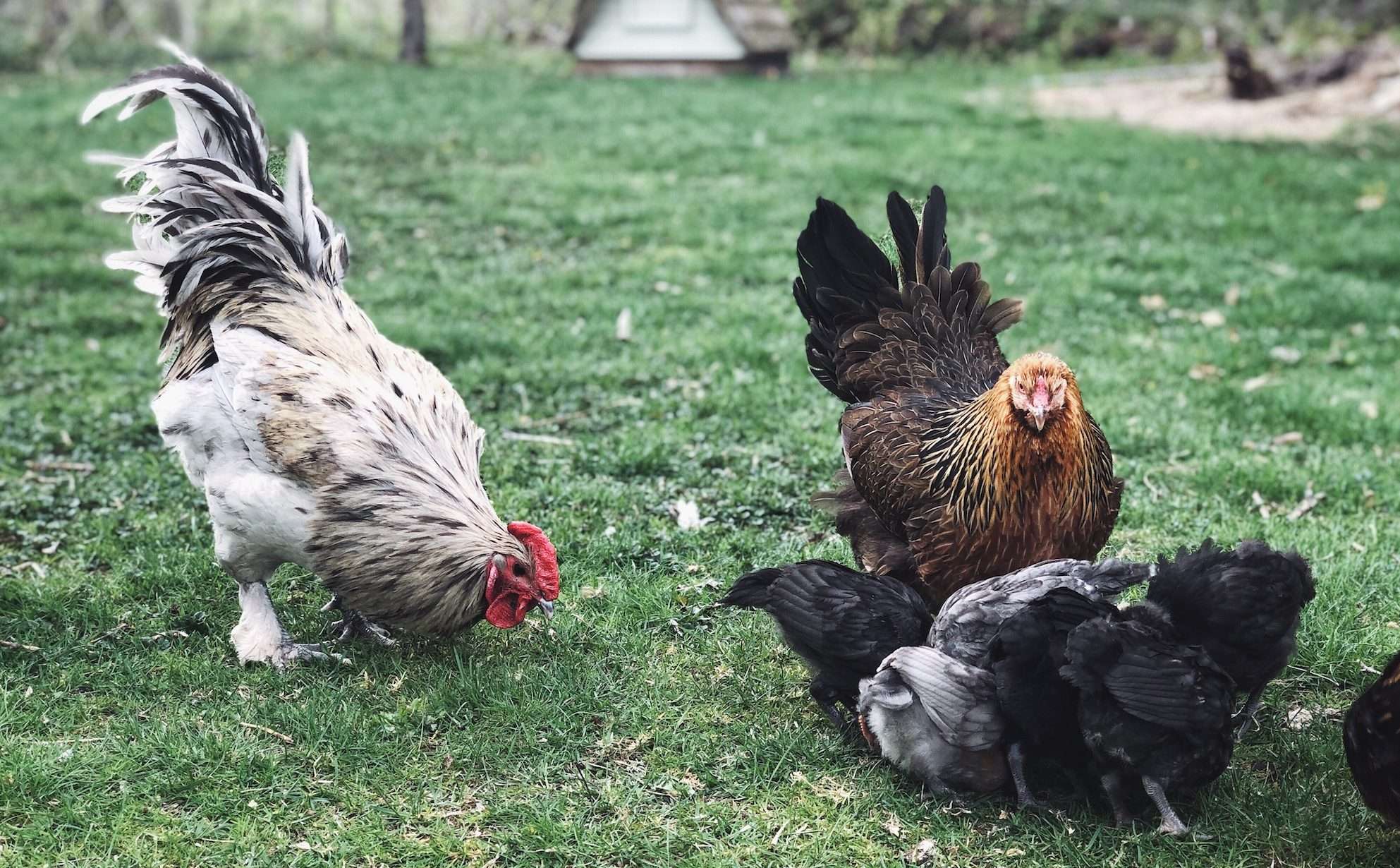
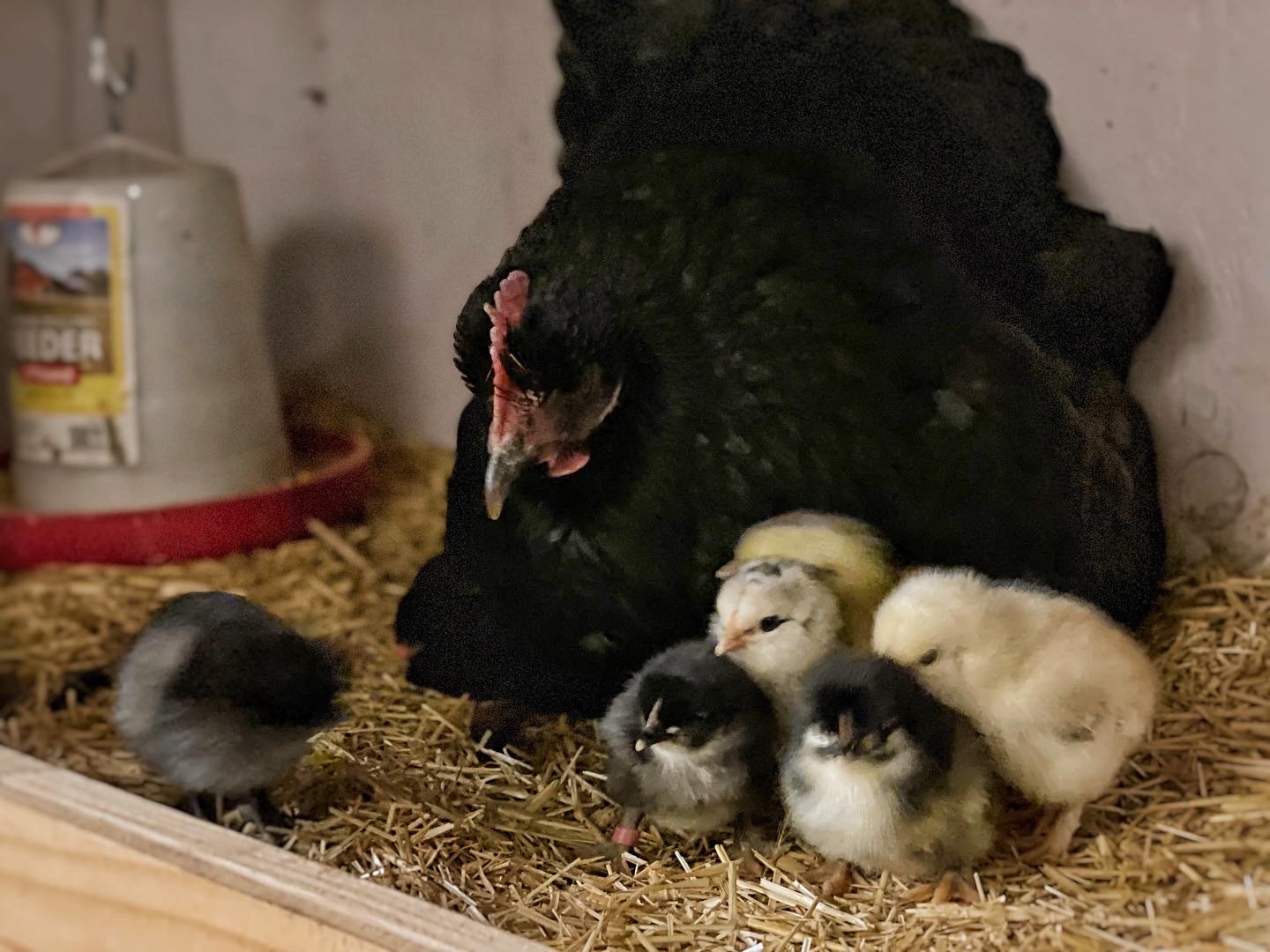
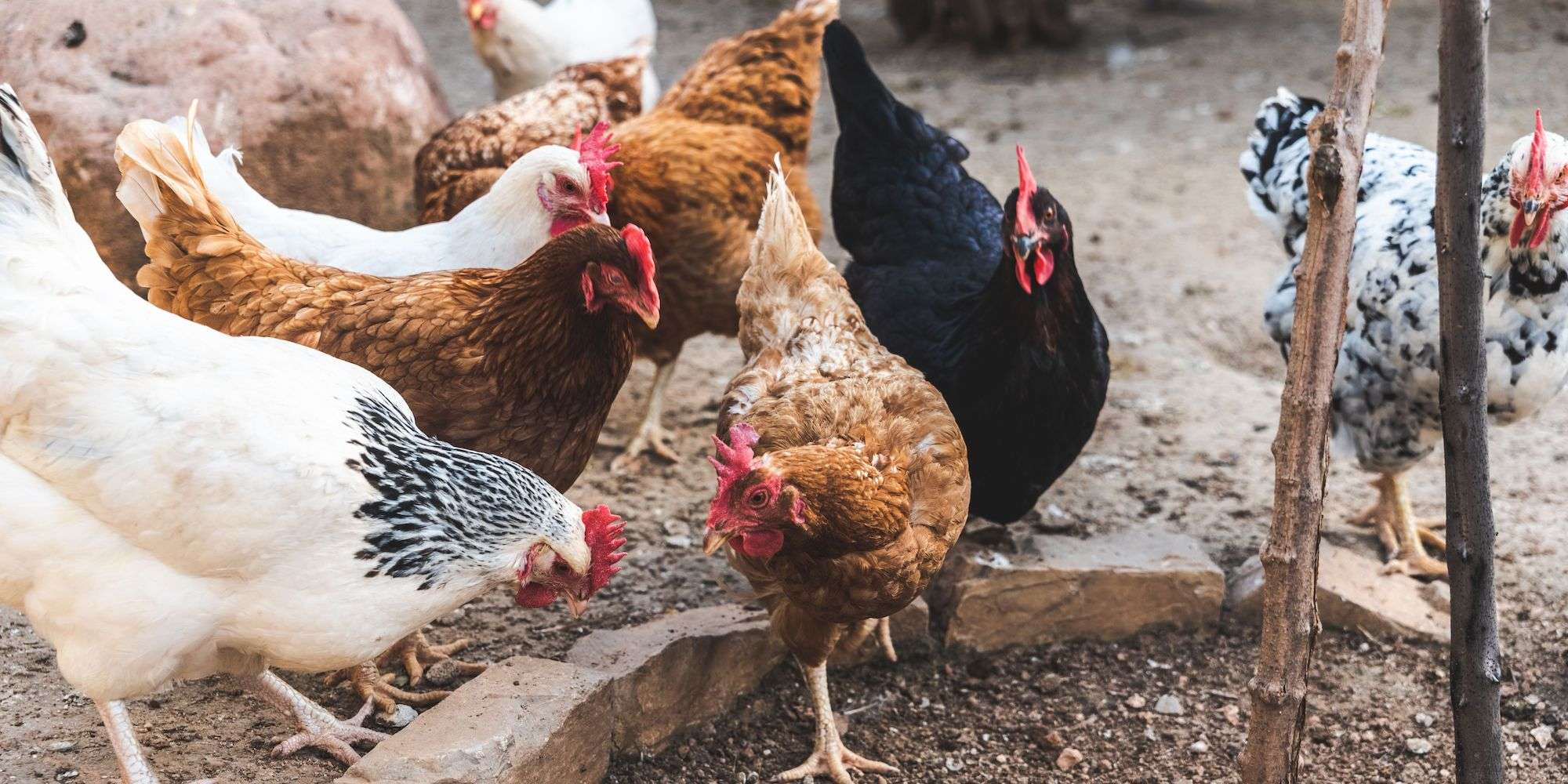








I am a 2-acre acher, well past my prime but still have my chickens and my herbs. I grew up on small plots where we always had chickens, no matter where we were planted. The following ponderings are from my experiences with free-range flocks. It has been my experience that chicks hatched before Easter seemed to have a higher ratio of females to males, while broods hatched later in the spring were predominately cockerels. As little children, our late-spring chore, after one brood had hatched, was to be sure all the eggs from the shrubs and hidey-holes were collected and no more hens were brooding. It makes me wonder about Easter-egg hunts prior to colored eggs and Disney.
I am retired now and have time to experiment. Last summer I incubated 8 eggs from my own flock. I had a 50% ratio of males to females. That’s normal. In January I collected 12 eggs from the unheated chicken coop. Six of those eggs hatched. Only two are cockerels. (I did not use one of your recommended incubators.)
I realize this is a small sample and, to one with a small flock, the difference between 3-of-6 and 2-of-6 is pretty insignificant. However, one would think keeping hens in a cooler pen might make a huge difference to an industry that kills 300 million chicks a year. More research (and more accurate research) is certainly needed but it is a point to ponder.
This is a great post. I personally have many chickens and find it funny when I tell someone, who doesn’t know about chickens, about their egg song. It’s funny to see their expression wondering if I’m crazy or not. Really enjoyed reading and have to say you have great advice.
Thank you so much for your kind words! Nice to meet another chicken-lover, too! 🙂
I’ve always wondered what it would be like to have chickens!
They are fun creatures, that’s for sure!
This brings me so many memories. You have provided very useful information that people need to consider before having chickens. Thanks!
I’m so glad to hear that! You must have had chickens at some point. They are such fun creatures to have around 🙂
This is a great article Katie. It brought back memories of my childhood in Jamaica. I raised a lot of chickens and can relate to many of the things in your blog.
Thank you so much and I’m glad to hear that you enjoyed it 🙂
What a great post! I am going to bookmark this and come back for reference. We were going to get chickens this year but a variety of reasons prevented us. But next year, maybe! Your list on the quieter chickens is greatly appreciated as we are in a Urban-steading setting.
Thank you so much!
Exciting! You’re going to love having chickens around!
I love keeping chickens, not nearly as much as I love my goats but chickens are pretty cool. I could do without all the noise though. I’m going to be taking some of your advise and see if it helps the noise level.
I hope it helps! I’d love to get goats someday… need to convince my husband! haha
We always love the egg song! My kids also love to join in and sing along with the hen.
That’s so fun! I love it, too!
A great, information packed post, as always! This one, though, is my favorite yet! I love the breakdown of everything, especially the noises! Is it just me, or do the Dispute Call and Egg Song sound a lot alike?
Thank you! This was a fun one to write. Haha, yes, they do sound similar! I think the hen is a big agitated in both cases, lol. I’d be upset after passing a large egg, too!
Can I just say, what a brilliant post! I love all the pictures and the noises you’ve included so helpful! thank you
Thank you! I’m glad you enjoyed it 🙂
So much information! I love this post, I never thought of different breeds being quieter than some 🙂
Thank you! Definitely! Of course they will each have their own personalities, but there are breed differences for sure.